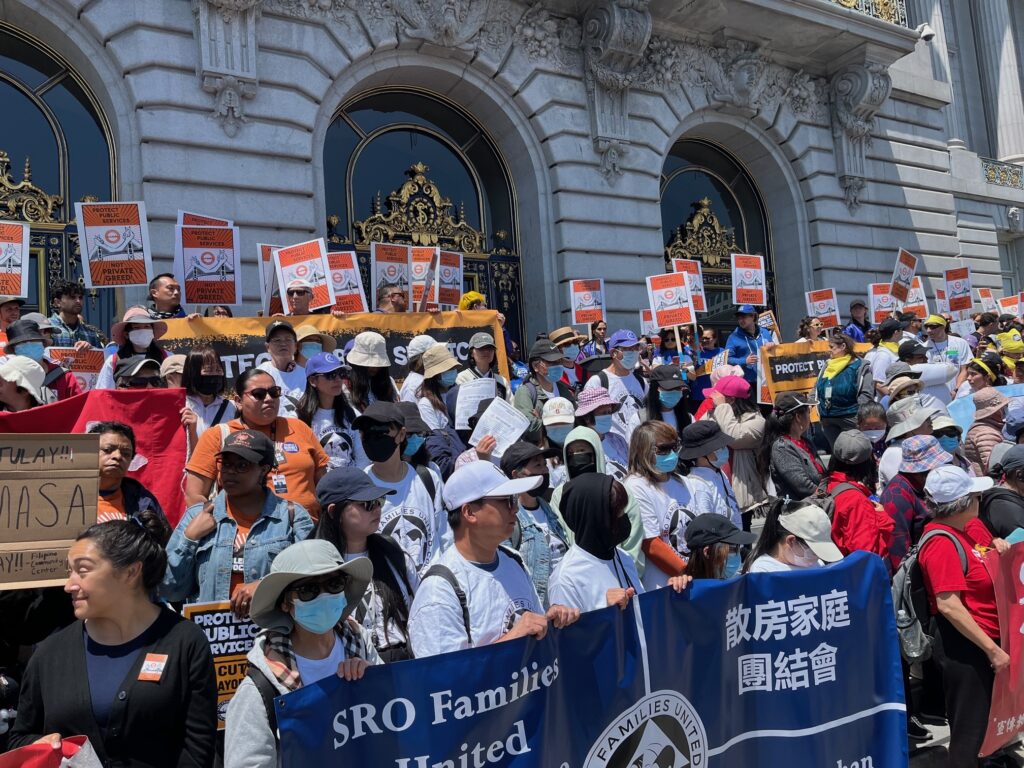Hundreds, maybe thousands of people will converge on City Hall Monday/23 as the Budget and Appropriations Committee holds its final public-comment session and prepares to vote on Mayor Daniel Lurie’s budget.
The final day of public comment is often long, with speakers lined up in the halls outside the Board of Supes chambers. But this budget is the most brutal in many years, and both labor and community activists will want to weigh in before the committee votes on the plan.
The People’s Budget Coalition will be organizing to bring members out, and leaders will meet with the news media at 11am. I expect labor, which shut down the supes meeting last week, will also be there in force.

The supes have limited power here: The mayor controls the budget and spending, and most years, the board negotiates changes that amount to about 1 percent of the spending. Still, that could be millions of dollars that are desperately needed for public services.
In fact, the only power the board holds is the ability to vote down the budget. That would be almost unprecedented; it hasn’t happened in the 40-plus years I’ve been covering City Hall. Lurie has enough allies on the board that he will likely get six votes.
But even a few No votes would send a message—particularly in next year’s elections, when the new right-wing Yimby group called Blueprint will try to consolidate big-money power and narrow even further the progressive representation on the board.
Two of the members of the Budget and Appropriations Committee—Sups. Matt Dorsey and Rafael Mandelman—were at the plutocrats’ kickoff.
By next fall, the impacts of the budget cuts will be visible on the streets. The supes who vote for those cuts, and their allies, will have to answer for the results.
That hearing starts at 10am. It will last all day.
The next day, the full board will vote on a resolution that would address the city’s ongoing, structural budget crisis in a different way: By seeking new taxes on the very rich. The resolution will come before the full board for adoption without committee reference, although any supervisor can demand that it be sent a committee.
So either the supes will have some discussion of this Tuesday, or there will be a more detailed committee hearing soon.
The resolution would mark the first time in decades that the supes have even seriously discussed a local income tax, and it couldn’t come at a more critical time. Just a modest tax on the 5,000 richest San Franciscans, to match what they save with the Trump tax cuts, would resolve the budget problem.
Meanwhile, San Francisco remains a city with among the highest economic inequality in the country.
Income and wealth taxes serve two purposes in 2025: They provide crucial funding for services—and they reduce that inequality, which is an existential crisis for humanity.
I asked state Sen. Scott Wiener last week if he supported the idea of allowing local income taxes, which would require approval from the Legislature, and he said he didn’t think he could get that bill out of a single committee. But if cities like San Francisco are going to be anything more than places that pay for cops and jails and starve affordable housing, transit, health care, parks and recreation and other key services, Wiener and his powerful pals in Sacramento will at least have to try.
That meeting starts at 2pm.
The full board will also consider a proposal that would allow the expansion of a homeless shelter in the Bayview that has strong opposition from the district Supe, Shamann Walton. The issue is more than one shelter in a neighborhood that clearly has more than its share: It’s about Lurie wanting to address the homeless crisis by putting more people in dorms and congregate spaces to get them off the streets—and out of view. It’s about taking money away from the creation of new permanent supportive housing and turning it into short-term spaces that don’t work for many people.
The Budget and Appropriations Committee sent the proposal to the full board without recommendation. In general, the board tends to defer to district supes on local issues, and this is a local issue—so it will be a test of Lurie’s ability to get the board to force one of its own members to accept something that nobody in his district wants.
That meeting starts at 2pm.






